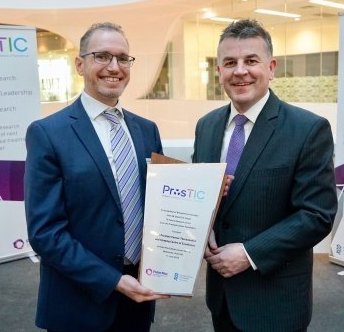Oncologists have welcomed news that whole body PSMA PET/CT scans will be funded by Medicare from 1 July for informing treatment of patients with prostate cancer.
The prostate-specific membrane antigen (PSMA) PET/CT scans were recommended for funding by the Medicare Services Advisory Committee in 2021 after Australian research showed they were more accurate than conventional imaging using CT and bone scan in the initial staging and restaging of prostate cancer.
“This is truly practise changing for the management of men with prostate cancer in Australia,” said Professor Michael Hofman, Director of the Prostate Cancer Theranostics and Imaging Centre of Excellence (ProsTIC) at the Peter MacCallum Cancer Centre, Melbourne.
“This funding provides important equitable access for patients with the most commonly diagnosed cancer in Australia.”

Prof Michael Hofman (L) and Prof Declan Murphy (R)
Until now, the out of pocket expenses for patients accessing these scans has been almost a thousand dollars.
The primary data in the MSAC funding application for a MBS item came from Professor Hofman’s ProPSMA study, published in the Lancet in 2020.
The randomised trial ran across 10 sites, involving 300 patients with prostate cancer. It found that PSMA PET/CT scans had a 27% greater accuracy than that of conventional imaging (92% vs 65%).
PSMA PET/CT scans provided better sensitivity and more definitive results for patients with pelvic nodal metastases, and for patients with distant metastases. It also provided lower radiation exposure, and informed more effective management changes of prostate cancer than conventional imaging.
Professor Declan Murphy, ProPSMA senior author and Director of Genito-urinary (GU) Oncology at Peter Mac said PSMA PET/CT was a “game changer” by detecting disease that previous medical scanning technology failed to detect.
“Better detection of cancer spread is critical to direct curative treatments whilst also avoiding additional treatments that may be harmful. This is a great day for men with prostate cancer in Australia.”
In the MSAC application, there were two proposed patient populations for PSMA PET/CT:
Population 1 included patients with biopsy-proven prostate adenocarcinoma with intermediate – or high-risk features who have not undergone previous treatment but are considered suitable for locoregional therapy with a curative intent, for whom PSMA PET/CT is used for primary staging.
Population 2 included patients with recurrent prostate adenocarcinoma for whom locoregional therapy is considered suitable to determine appropriate therapeutic pathways and timing of treatment initiation. For these patients, PSMA PET/CT is used to identify the location of the prostate cancer recurrence, in particular, for locating sites of metastatic disease to help guide treatment decisions. The scans would inform decisions to delay systemic therapy.